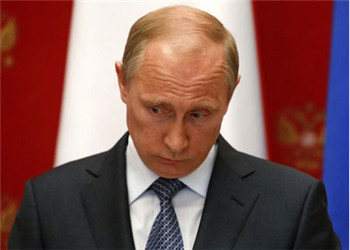(单词翻译:单击)

Russians shrug at the thought of a 3 per cent currency devaluation, such as the renminbi experienced last week. After all, the rouble experiences similar swings almost daily.
人民币上周走低3%。对于这种幅度的贬值,俄罗斯人只会耸耸肩。毕竟,卢布几乎天天经历这样的波动。
But as Russia puts ever greater weight on its ties with China as part of President Vladimir Putin’s strategy of “pivoting to Asia”, the slowdown in the Chinese economy is not so easy to shrug off.
但是,随着俄罗斯按照弗拉基米尔渠京(Vladimir Putin)总统“转向亚洲”的战略,越来越注重其与中国的关系,中国经济放缓并不是靠耸耸肩就能轻松抛在脑后的。
Russia this month reported that its recession deepened in the second quarter, with the economy contracting 4.6 per cent year on year.
俄罗斯本月报告第二季度经济衰退加剧,经济同比收缩4.6%。
China is Russia’s single largest trade partner, accounting for $30.6bn of imports and exports in the first half of the year. That figure represents a 28.7 per cent fall from a year earlier, according to Russian customs data. However, Russia’s trade with China has declined less than with other countries, meaning that China has increased its share of Russia’s trade from 10.8 per cent to 11.4 per cent.
中国是俄罗斯最大的贸易伙伴,上半年双边进出口总额达到306亿美元。根据俄罗斯海关数据,这个数字代表着28.7%的同比跌幅。然而,俄罗斯对华贸易的降幅小于该国对其他国家贸易的降幅,这意味着中国在俄罗斯对外贸易中的占比从10.8%提高至11.4%。
Oleg Kouzmin, an economist at Renaissance Capital in Moscow, says the sheer size of China’s economy means the country will continue to represent an opportunity for Russia, even in an environment of slower growth. “In physical amounts, the volumes of their exports is still considerable. They’re still buying a lot from Russia,” he says.
莫斯科晋新资本(Renaissance Capital)经济学家奥列格柯兹敏(Oleg Kouzmin)表示,中国经济的庞大规模意味着,其对俄罗斯而言将继续代表着一个机遇,即便在经济增长放缓的环境也是如此。“就绝对数量而言,他们的出口量仍相当可观。他们也仍在从俄罗斯购买很多东西,”他说。
Moreover, Mr Kouzmin points out that the focus on increasing economic ties between the two countries is primarily a political project built on grandiose deals, such as the 30-year gas export contract signed between Gazprom and CNPC last year. “To a large extent it’s a politically driven decision,” he says. “Politics doesn’t get scared by all this stuff about GDP.”
此外,柯兹敏指出,俄中加强经贸往来主要是一项政治工程,其着眼点是一些宏大的交易,如俄罗斯天然气工业股份公司(Gazprom)去年与中国石油天然气集团公司(CNPC)签署的30年天然气出口合同。“在很大程度上,那是一个政治决策,”他说。“政治不会被这些关于GDP的细枝末节吓倒。”
Even the grand political projects are not immune from the effects of China’s economic swoon, however.
然而,就连宏大的政治工程也无法免受中国经济低迷的影响。
In the energy sector, Gazprom has been hoping to sign another deal for exports to western China. A deal on the “western route” is important for the state-controlled gas export monopoly as it would allow it to deliver gas from its existing west Siberian fields, which produce much less than their full capacity.
在能源领域,Gazprom一直希望签署另一笔协议,向中国西部出口。“西线”交易对于这家国有控股的天然气出口垄断企业十分重要,因为这将使其能够从现有的西西伯利亚气田输送天然气,那里目前的产量远低于全部产能。
But negotiations are progressing slowly, according to people familiar with the talks.
但据知情人士透露,谈判进展缓慢。
Jonathan Stern, chairman of gas research at the Oxford Institute for Energy Studies, says that a sharp slowdown in Chinese gas demand in the past year has strengthened Beijing’s hand.
牛津能源研究所(Oxford Institute for Energy Studies)天然气研究负责人乔纳森斯特恩(Jonathan Stern)表示,过去一年里中国天然气需求大幅放缓,加强了中方的谈判地位。
“The Chinese are really in the driving seat. Their economy is doing poorly; gas demand is way down on what we thought it would be. They’re in a really strong position to negotiate with the Russians,” he says.
“中国人确确实实坐在驾驶员座位。他们的经济表现不佳;天然气需求远低于我们预测的水平。他们在与俄方谈判时处在真正的有利地位,”他说。
There are some bright spots. The decline in the rouble since last December has stimulated an increase in Russian exports of certain products, such as sunflower oil and beer, to China, says Evgeny Gavrilenkov of Sberbank CIB.
也有一些亮点。俄罗斯联邦储蓄银行(Sberbank CIB)叶夫根尼加夫里连科夫(Evgeny Gavrilenkov)表示,自去年12月以来卢布下跌,推动了俄罗斯某些产品的对华出口,如葵花子油和啤酒。
“Russian manufacturing companies have become competitive in principle on the Chinese market,” he says. “Russian small and medium-sized business is quite adaptable. If there is a demand in China it will always be possible to find some niches on the Chinese market.”
“俄罗斯制造企业原则上已在中国市场变得有竞争力,”他说。“俄罗斯中小企业的适应力较强。只要中国存在需求,总有可能在中国市场找到某些缝隙领域。”
In comments carried by the news agency Ria Novosti, the Russian central bank said the devaluation of the renminbi would have “no significant impact” on the rouble. The bank argued that in the medium term it might even lead to a stronger rouble by helping to stimulate a recovery in the Chinese economy, and so in commodity prices.
据俄新社(Ria Novosti)报道,俄罗斯央行表示,人民币贬值对卢布“没有显著影响”。该行认为,中期而言此举甚至可能导致卢布走高,因为它有助于刺激中国经济复苏,进而推高大宗商品价格。
Mr Gavrilenkov points out that it is the volatility of the rouble — which has nearly halved in value against the dollar in the past 12 months — rather than the volatility of the renminbi that is holding back Chinese investment in Russia. “This is not an environment where you can make long-term decisions,” he says. “This is what holds people back from moving to invest in Russia.”
加夫里连科夫指出,妨碍中国对俄投资的不是人民币的波动,而是卢布的波动;过去12个月期间卢布兑美元汇率近乎减半。“这不是一个你可以做长期决策的环境,”他表示。“这才是阻止人们到俄罗斯投资的因素。”


